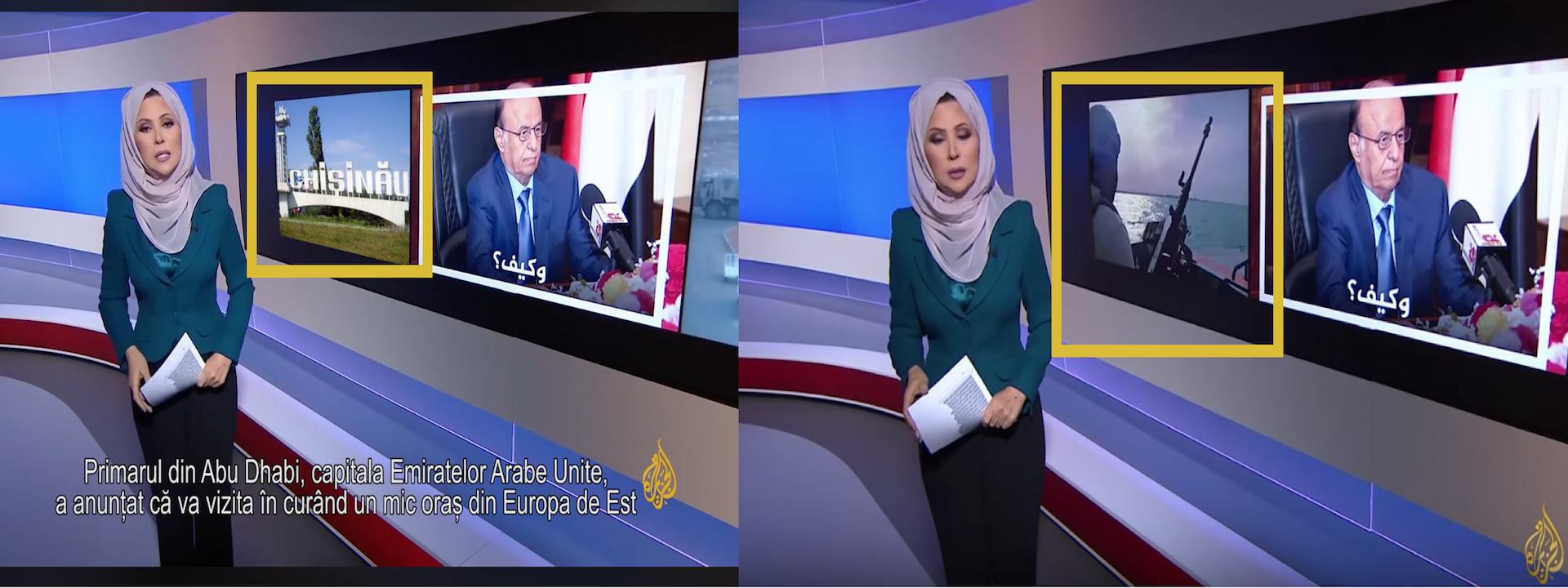#ElectionWatch: Doctored Video Goes Viral Ahead of Elections in Moldova
A doctored viewed half a million times ahead of the local elections in Chisinau
#ElectionWatch: Doctored Video Goes Viral Ahead of Elections in Moldova

A doctored viewed half a million times ahead of the local elections in Chisinau

[facebook url=”https://www.facebook.com/stiripespuse/videos/261314841095669/” /]

(Source: Arabic translation to English by Siham Gaiz, Romanian translation to English by StopFals.md)
Whereas the original monologue in Arabic focused on the strained UAE-Yemen relationship and went on to discuss the size of Chisinau and its water pipelines, the Romanian subtitles told a very different story. According to the subtitles, the mayoral candidate Andrei Nastase came up with a proposal to lease the city of Chisinau to the UAE for 50 years, which is not true. The glaring discrepancy between the two texts showed that this was not likely an honest translation mistake, but rather an intentional attempt to spread a false story about a mayoral candidate. This falls squarely into what @DFRLab defines as disinformation, or the deliberate spread of false information.
In fact, the video itself was manipulated and edited. @DFRLab compared the video shared by Stiri Pespuse and the original Al Jazeera video and found that the Stiri Pespuse cut and edited the original video to create the false impression that a mayoral candidate was going to lease Chisinau to the UAE.
Two things are necessary to expose and explain either disinformation or “fake news”:
1. Proof that the claims made are false.
2. Proof that the falsehood was deliberate.
Both are evident in this case.
https://www.youtubemultiplier.com/5af52c2c5483d-mashup-moldova-by-dfrlab.php
We found that one of the images on the studio screen was replaced with an image of Chisinau’s city sign to create the illusion that the journalists was indeed talking about Moldova, when in fact, the news segment covered the geopolitical tensions between the UAE and Yemen.

Spread
The doctored video was watched more than 303,000 times on Facebook alone.
The video was also highly popular on OK.ru, a Russian social networks site popular among Moldova’s Russian-speakers. On OK, it was watched 248,590 times.

Apart from Facebook and OK.ru, the video was also uploaded on YouTube, where it was watched another 1,300 times.
In total, the video was watched more than half a million times online ahead of the elections in Chisinau, home to 685,900 Moldovans, meaning that most of Chisinau voters have likely seen the video circulating on various social media networks.
Source
The source of the doctored video appears to be the newly-registered digital media site, Stiri pe Spuse. According to site’s WHOis data, the website was registered on February 9, 2018. It is unclear who runs the site or the outlet’s Facebook page as Stiri pe Spuse has no named journalists, editors, or contributors. A phone number listed on Stiri pe Spuse’s “About” section on Facebook was not available.
Conclusion
The popularity of the doctored video shows how fast a sensationalist piece of falsified content can spread through social networks ahead of the elections. It was noteworthy that the fake video was watched more than half a million times across multiple platforms, but an article debunking the hoax published by the StopFals.md was only read by less than 900 people at the time this article was written. This goes to show that once a hoax gains traction in the digital engagement space, very little can be done to curtail its spread or undo its impact.
This is not the first time that the @DFRLab observed mistranslated subtitles being used to spread disinformation. Back in March 2018, @DFRLab wrote about a video with false subtitles spreading in the Ukrainian information space. The video alleged to depict Lithuania’s Minister of Defense Raimundas Karoblis recognizing Russia’s illegal annexation of Crimea as part of the Russian Federation.
Both serve as stark reminders for citizens to remain vigilant and skeptical when consuming information online from new or unverified sources. Only this can produce digital resilience across society.
Follow along for more in-depth analysis from our #DigitalSherlocks.

